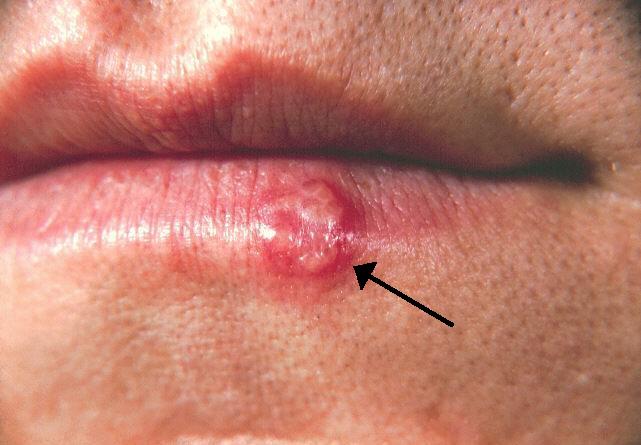Cold sore

Editor-In-Chief: Prab R Tumpati, MD
Obesity, Sleep & Internal medicine
Founder, WikiMD Wellnesspedia &
W8MD's medical weight loss NYC, sleep center NYC
Philadelphia medical weight loss and Philadelphia sleep clinics
| Cold sore | |
|---|---|

| |
| Synonyms | Fever blister, oral herpes, herpes labialis |
| Pronounce | N/A |
| Specialty | N/A |
| Symptoms | Blisters, itching, pain, tingling |
| Complications | Herpetic whitlow, herpes simplex encephalitis, herpes simplex keratitis |
| Onset | 2–12 days after exposure |
| Duration | 7–10 days |
| Types | N/A |
| Causes | Herpes simplex virus (HSV-1, sometimes HSV-2) |
| Risks | Stress, fatigue, sunburn, fever, menstruation |
| Diagnosis | Physical examination, viral culture, PCR |
| Differential diagnosis | Aphthous stomatitis, impetigo, angular cheilitis |
| Prevention | Avoiding triggers, sunscreen, antiviral medication |
| Treatment | Antiviral drugs (e.g., acyclovir, valacyclovir) |
| Medication | N/A |
| Prognosis | N/A |
| Frequency | Common |
| Deaths | Rare |

Cold sore (also known as herpes labialis) is a type of infection caused by the herpes simplex virus (HSV). There are two types of HSV: HSV-1 and HSV-2. Cold sores are most commonly caused by HSV-1.
Causes[edit]
Cold sores are caused by the herpes simplex virus. Most cold sores are caused by the HSV-1 strain, although the HSV-2 strain, typically associated with genital herpes, can also cause them. The virus is highly contagious and can be transmitted through direct contact with the sores or even with the saliva of an infected person.
Symptoms[edit]
The primary symptom of a cold sore is a painful blister on the lip or around the mouth. Before the blister appears, the person may experience tingling, itching, or burning in the area. The blister will eventually break, leak a clear fluid, and then crust over. Cold sores typically heal within two weeks without leaving a scar.
Treatment[edit]
While there is no cure for the herpes simplex virus, there are treatments available to manage the symptoms of a cold sore. Antiviral medication can help to speed up the healing process, reduce the frequency of outbreaks, and lower the risk of transmitting the virus to others. Over-the-counter treatments can also help to alleviate the pain and discomfort associated with cold sores.
Prevention[edit]
Prevention methods for cold sores include avoiding direct contact with the sores or saliva of an infected person, not sharing personal items like toothbrushes or lip balm, and using a lip balm with sun protection factor (SPF) to protect the lips from the sun, as exposure to sunlight can trigger an outbreak.
See also[edit]
Ad. Transform your life with W8MD's Budget GLP-1 injections from $49.99


W8MD offers a medical weight loss program to lose weight in Philadelphia. Our physician-supervised medical weight loss provides:
- Weight loss injections in NYC (generic and brand names):
- Zepbound / Mounjaro, Wegovy / Ozempic, Saxenda
- Most insurances accepted or discounted self-pay rates. We will obtain insurance prior authorizations if needed.
- Generic GLP1 weight loss injections from $49.99 for the starting dose of Semaglutide and $65.00 for Tirzepatide.
- Also offer prescription weight loss medications including Phentermine, Qsymia, Diethylpropion, Contrave etc.
NYC weight loss doctor appointmentsNYC weight loss doctor appointments
Start your NYC weight loss journey today at our NYC medical weight loss and Philadelphia medical weight loss clinics.
- Call 718-946-5500 to lose weight in NYC or for medical weight loss in Philadelphia 215-676-2334.
- Tags:NYC medical weight loss, Philadelphia lose weight Zepbound NYC, Budget GLP1 weight loss injections, Wegovy Philadelphia, Wegovy NYC, Philadelphia medical weight loss, Brookly weight loss and Wegovy NYC
|
WikiMD's Wellness Encyclopedia |
| Let Food Be Thy Medicine Medicine Thy Food - Hippocrates |
Medical Disclaimer: WikiMD is not a substitute for professional medical advice. The information on WikiMD is provided as an information resource only, may be incorrect, outdated or misleading, and is not to be used or relied on for any diagnostic or treatment purposes. Please consult your health care provider before making any healthcare decisions or for guidance about a specific medical condition. WikiMD expressly disclaims responsibility, and shall have no liability, for any damages, loss, injury, or liability whatsoever suffered as a result of your reliance on the information contained in this site. By visiting this site you agree to the foregoing terms and conditions, which may from time to time be changed or supplemented by WikiMD. If you do not agree to the foregoing terms and conditions, you should not enter or use this site. See full disclaimer.
Credits:Most images are courtesy of Wikimedia commons, and templates, categories Wikipedia, licensed under CC BY SA or similar.
Translate this page: - East Asian
中文,
日本,
한국어,
South Asian
हिन्दी,
தமிழ்,
తెలుగు,
Urdu,
ಕನ್ನಡ,
Southeast Asian
Indonesian,
Vietnamese,
Thai,
မြန်မာဘာသာ,
বাংলা
European
español,
Deutsch,
français,
Greek,
português do Brasil,
polski,
română,
русский,
Nederlands,
norsk,
svenska,
suomi,
Italian
Middle Eastern & African
عربى,
Turkish,
Persian,
Hebrew,
Afrikaans,
isiZulu,
Kiswahili,
Other
Bulgarian,
Hungarian,
Czech,
Swedish,
മലയാളം,
मराठी,
ਪੰਜਾਬੀ,
ગુજરાતી,
Portuguese,
Ukrainian
